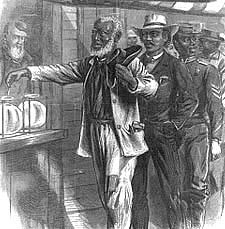15th Amendment to the Constitution
The
15th Amendment to the Constitution granted African
American men the right to vote by declaring that the "right
of citizens of the United States to vote shall not be denied
or abridged by the United States or by any state on account
of race, color, or previous condition of servitude." Although
ratified on February 3, 1870, the promise of the 15th Amendment
would not be fully realized for almost a century. Through
the use of poll taxes, literacy tests and other means,
Southern states were able to effectively disenfranchise
African Americans. It would take the passage of the Voting
Rights Act of 1965 before the majority of African Americans
in the South were registered to vote.
Library of
Congress Web Site | External Web
Sites | Selected
Bibliography
The
African-American Experience in Ohio, 1850-1920
Includes a pamphlet of Professor
J.M. Langston's oration delivered in 1874 at the 15th
Amendment Celebration held in Oberlin, Ohio.
Search
this collection, using the phrase "15th amendment"
or "fifteenth amendment" to find additional
newspaper articles and pamphlets on this topic.
African
American Perspectives: Pamphlets from the Daniel A.P.Murray
Collection, 1818-1907
Edward
Morrell, a congressman from Pennsylvania, delivered
a speech in 1904 that refutes the argument that African
Americans should be deprived of the right to vote. Following
his speech are testimonials on both sides of the question,
some from men such as Wendell Phillips and James Garfield.
Search
in this collection using the words "suffrage"
to find additional documents related to African Americans
and voting rights.
An
American Time Capsule: Three Centuries of Broadsides
and Other Printed Ephemera
Contains a broadside printed in Connecticut of President
Ulysses S. Grant’s message to Congress announcing
the ratification of the 15th Amendment.
A
Century of Lawmaking for a New Nation
The
House of Representatives passed the 15th Amendment
on February 25, 1869, by a vote of 144 to 44, and the
Senate
passed the 15th Amendment on February 26, 1869, by a vote
of 39 to 13. On March 30, 1870, Secretary
of State Hamilton Fish issued a proclamation certifying
the ratification of the 15th Amendment by the states.
Search
this collection in the 40th Congress using keywords such
as "suffrage", "amendment" and "constitution"
to find additional information on the 15th Amendment.
After conducting a search look for references to Senate
Joint Resolution 8, Proposing an Amendment to the Constitution
of the United States, which is often referred to as S.
R. No. 8 or S. R. 8.
From
Slavery to Freedom: The African-American Pamphlet Collection,
1822-1909
In 1872, the Union
Congressional Republican Committee published a pamphlet
outlining policy differences between Republicans and Democrats
on the issue of suffrage for African Americans and the
15th Amendment.
Search
this collection using the word "suffrage" to
retrieve over twenty documents on this topic.
African-American
Odyssey: A Quest for Full Citizenship
This exhibition showcases the African American collections
of the Library of Congress. Displays more than 240 items,
including books, government documents, manuscripts, maps,
musical scores, plays, films, and recordings. Contains
a section on Reconstruction that
includes a picture from Harper's Weekly entitled "The
First Vote."
American
Treasures of the Library of Congress - The Fifteenth
Amendment
Contains a lithograph of a parade in Baltimore, Maryland,
celebrating the 15th Amendment on May 19, 1870.
March
7, 1965
The Selma-to-Montgomery March for African American voting
rights began on March 7, 1965. On the outskirts of Selma
the marchers, in plain sight of photographers and journalists,
were brutally assaulted by heavily armed state troopers
and deputies.

Black Voting
Rights: The Creation of the Fifteenth Amendment, HarpWeek
Constitution
of the United States of America,
Government Printing Office
Documents
from Freedom: A Documentary History of Emancipation,
1861-1867, University of Maryland
Our
Documents, 15th Amendment to the U.S. Constitution,
National Archives and Records Administration
Toward Racial
Equality: Harper’s Weekly Reports on Black America,
1857-1874, HarpWeek
Darling, Marsha J. Tyson, ed. Race,
Voting, Redistricting, and the Constitution: Sources
and Explorations on the Fifteenth
Amendment. New York: Routledge. [Catalog
Record]
Gillette, William. The Right to Vote:
Politics and the Passage of the Fifteenth Amendment. Baltimore: Johns Hopkins
Press, 1969. [Catalog
Record]
Maltz, Earl M. Civil Rights, the
Constitution, and Congress, 1863-1869. Lawrence, Kan.: University Press of Kansas,
1990. [Catalog
Record]
Mathews, John Mabry. Legislative
and Judicial History of the Fifteenth Amendment. Union, N.J.: Lawbook Exchange,
2001. [Catalog
Record]
Banfield, Susan. The Fifteenth Amendment:
African-American Men's Right to Vote. Springfield, N.J.: Enslow Publishers,
1998. [Catalog
Record]
|
